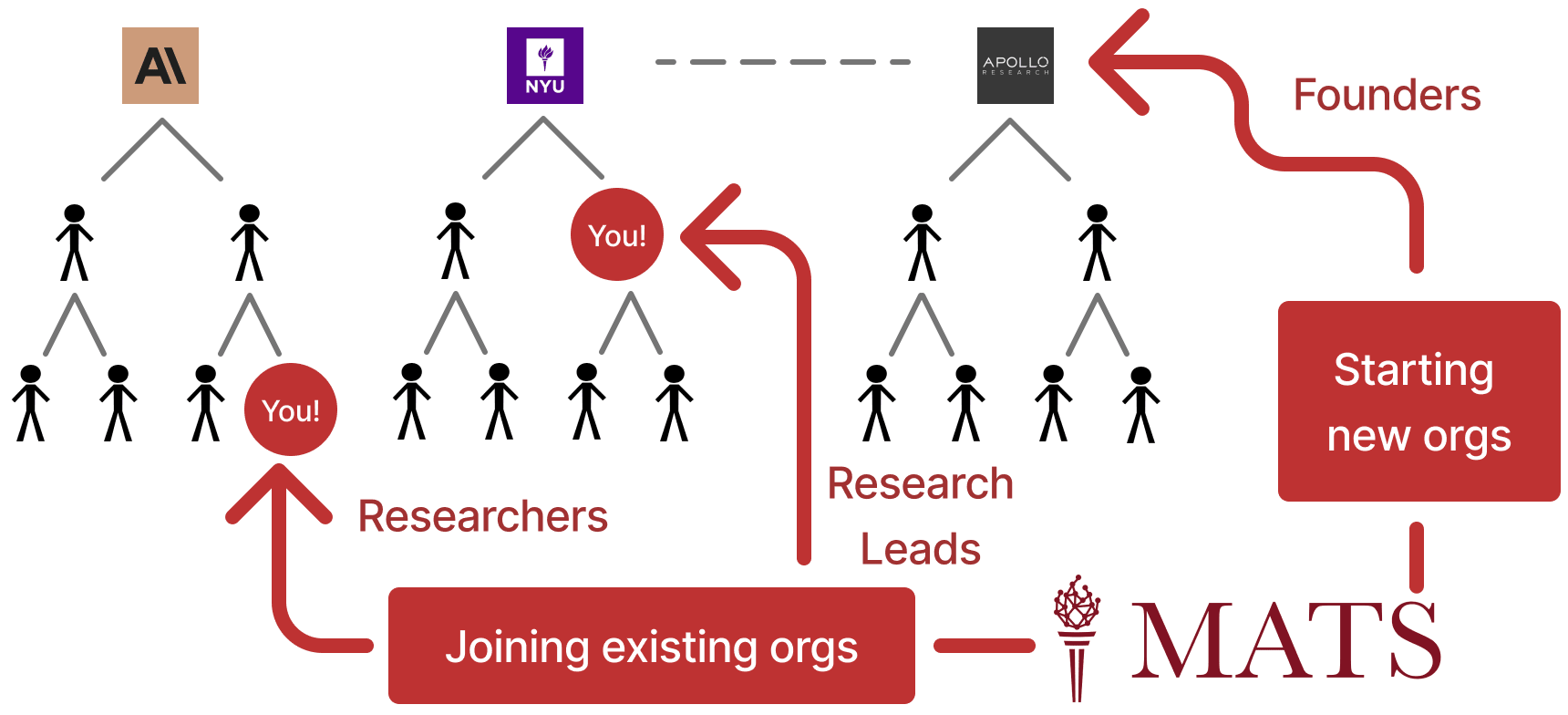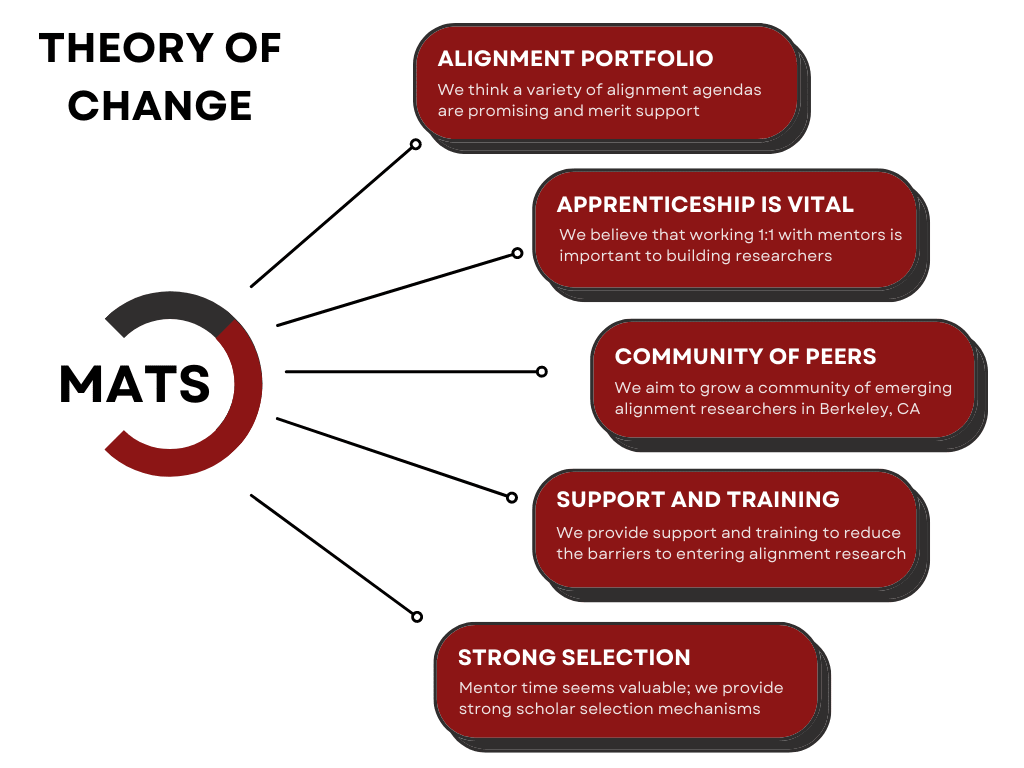Apply to MATS 7.0!
post by Ryan Kidd (ryankidd44), K Richards · 2024-09-21T00:23:49.778Z · LW · GW · 0 commentsContents
Program Details Applications (Now!) Research Phase (January 6-March 14) Research Milestones Community at MATS Extension Phase (April 14-August 2) Post-MATS Who Should Apply? Applying from Outside the US How to Apply None No comments
Applications are open for the ML Alignment & Theory Scholars (MATS) Winter 2024-25 Program, running Jan 6-Mar 14, 2025. First-stage applications are due Oct 6!
MATS is a twice-yearly, 10-week AI safety research fellowship program operating in Berkeley, California, with an optional 4-month extension program. Scholars are supported with a research stipend, shared office space, seminar program, support staff, accommodation, travel reimbursement, and computing resources. Our mentors come from a variety of organizations, including Redwood Research, Anthropic, Google DeepMind, UC Berkeley CHAI, Apollo Research, the UK AI Safety Institute, CAIS, and more! Our alumni have been hired by top AI safety teams (e.g., Anthropic, Google DeepMind, UK AISI, METR), founded research groups (e.g., Apollo Research, Timaeus, CAIP, Leap Labs), and maintain a dedicated support network for new researchers.

If you have any questions about the program or application process, MATS will be hosting two office hours on Sep 27, at 11 am and 6 pm PT. Sign up here!
If you know anyone who you think would be interested in the program, you can recommend them to us here!
We are currently not funding constrained for Winter, but are accepting donations to support the Summer 2025 Program. If you would like to support our work, you can donate here!
Program Details
MATS is an educational seminar and independent research program (40 h/week) in Berkeley, CA that aims to provide talented scholars with talks, workshops, and research mentorship in the field of AI alignment, and connect them with the Berkeley AI safety research community. MATS provides scholars with housing in Berkeley, CA, as well as travel support, a co-working space, and a community of peers. The main goal of MATS is to help scholars develop as AI safety researchers. You can read more about our theory of change here [LW · GW].

Based on individual circumstances, we may be willing to alter the time commitment of the program and arrange for scholars to leave or start early. Please tell us your availability when applying. Our tentative timeline for the MATS Winter 2024-25 program is below.
Scholars will receive a USD 12k stipend from AI Safety Support for completing the Training and Research Phases.
Applications (Now!)
Applications open: September 11
Applications are due: October 6
Note: Neel Nanda's applications follow a modified schedule and are now closed.
Research Phase (January 6-March 14)
The core of MATS is a two-month Research Phase. During this Phase, each scholar spends at least one hour a week working with their mentor, with more frequent communication via Slack. Mentors vary considerably in terms of their:
- Influence on project choices
- Attention to low-level details vs high-level strategies
- Emphasis on outputs vs processes
- Availability for meetings
Our Research Management team complements mentors by offering dedicated 1-1 check-ins, research coaching, debugging, and general executive help to unblock research progress and accelerate researcher development.
Educational seminars and workshops will be held 2-3 times per week. We also organize multiple networking events to acquaint scholars with researchers in the Berkeley AI safety community.
Research Milestones
Scholars complete two milestones during the Research Phase. The first is a Scholar Research Plan outlining a threat model or risk factor, a theory of change, and a plan for their research. This document will guide their work during the remainder of the program, which culminates in a research symposium attended by members of the Berkeley AI safety community. The second milestone is a ten-minute research presentation at this event.
Community at MATS
The Research Phase provides scholars with a community of peers, who share an office, meals, and housing. In contrast to pursuing independent research remotely, working in a community grants scholars easy access to future collaborators, a deeper understanding of other research agendas, and a social network in the AI safety community. Scholars also receive support from a full-time Community Manager.
In the past, each week of the Research Phase included at least one social event, such as a party, game night, movie night, or hike. Weekly lightning talks provided scholars with an opportunity to share their research interests in an informal, low-stakes setting. Outside of work, scholars organized social activities, including road trips to Yosemite, visits to San Francisco, pub outings, weekend meals, and even a skydiving trip.
Extension Phase (April 14-August 2)
At the conclusion of the Research Phase, scholars can apply to continue their research in a four-month Extension Phase cohort, in London by default. Acceptance decisions are largely based on receiving mentor endorsements and securing external funding. By this Phase, we expect scholars to pursue their research with high autonomy.
Post-MATS
After completion of the program, MATS alumni have:
- Been hired by leading organizations like Anthropic, OpenAI, Google DeepMind, METR, ARC, MIRI, Conjecture, and the US government, and joined academic research groups like UC Berkeley CHAI, NYU ARG, and MIT Tegmark Group;
- Founded AI safety organizations, including Apollo Research, Athena, Atla, Cadenza Labs, Center for AI Policy, Leap Labs, PRISM Eval, Simplex, and Timaeus.
- Pursued independent research [AF · GW] with funding from the Long-Term Future Fund, Open Philanthropy, Lightspeed Grants, Manifund, and the Foresight Institute.
- Scholars have helped develop new AI alignment agendas, including activation engineering [LW · GW], externalized reasoning oversight [AF · GW], conditioning predictive models [? · GW], developmental interpretability, evaluating situational awareness, and formalizing natural abstractions [LW · GW].
You can read more about MATS alumni here.
Who Should Apply?
Our ideal applicant has:
- An understanding of the AI safety research landscape equivalent to having completed AI Safety Fundamentals' Alignment Course (if you are accepted into the program but have not previously completed this course, you are expected to do so before the Training Phase begins);
- Previous experience with technical research (e.g. ML, CS, math, physics, neuroscience, etc.), generally at a postgraduate level; or
- Previous policy research experience or a background conducive to AI governance (e.g. government positions, technical background, strong writing skills, AI forecasting knowledge, completed AISF Governance Course);
- Strong motivation to pursue a career in AI safety research.
Even if you do not meet all of these criteria, we encourage you to apply! Several past scholars applied without strong expectations and were accepted.
If you have anyone that you would like to recommend for the program, please fill out our recommendation form.
Applying from Outside the US
Scholars from outside the US can apply for B-1 visas (further information here) for the Research Phase. Scholars from Visa Waiver Program (VWP) Designated Countries can instead apply to the VWP via the Electronic System for Travel Authorization (ESTA), which is processed in three days. Scholars who receive a B-1 visa can stay up to 180 days in the US, while scholars accepted into the VWP can stay up to 90 days. Please note that B-1 visa approval times can be significantly longer than ESTA approval times, depending on your country of origin.
How to Apply
Applications are now open. Submissions for most mentors are due on October 6.
Candidates first fill out a general application, then apply to work under a particular mentor who will independently review their application. Applications are evaluated primarily based on responses to mentor questions and prior relevant research experience. Information about our mentors' research agendas and application questions can be found on the MATS website.
Before applying, you should:
- Read through the descriptions and agendas of each stream and the associated candidate selection questions;
- Prepare your answers to the questions for streams you’re interested in applying to. These questions can be found on the application;
- Prepare your LinkedIn or resume.
The candidate selection questions can be quite hard, depending on the mentor! Make sure you allow adequate time to complete your application. A strong application to one mentor may be of higher value than moderate applications to several mentors (though each application will be assessed independently).
Note that the application is longer than it first seems because mentor-specific questions are hidden until you select a mentor.
If you have any questions about the program or application process, MATS will be hosting two office hours on Sep 27, at 11 am and 6 pm PT. Sign up here!
0 comments
Comments sorted by top scores.